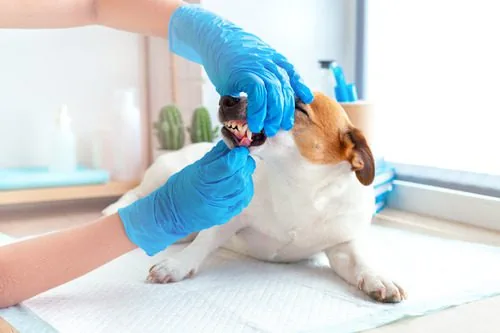Common Causes for Swollen Gums in Dogs
Swollen gums in dogs can be an alarming sight for any pet owner. You might notice redness along the gumline, bad breath, or even your dog avoiding food due to oral discomfort. While it may seem like a minor issue at first, inflamed gums can point to deeper dental or health concerns that require prompt attention. At Parrish Veterinary Clinic & Urgent Care, we can help you understand what causes swollen gums in dogs, so you will know when it’s time to seek veterinary care. In this blog, we’ll explore the most common causes of swollen gums in dogs, how to recognize warning signs, and why a trip to the veterinarian is often the next best step. If your dog’s gums look inflamed or painful, call Parrish Veterinary Clinic & Urgent Care at (941) 216-2335 or request an appointment today.

What Do Swollen Gums in Dogs Look Like?
Before diving into the causes, it helps to know what to watch for. Swollen gums in dogs often appear red, puffy, or inflamed, especially along the gumline. You may notice bleeding when your dog chews on toys or eats hard kibble. Some dogs drool more than usual or paw at their mouths in discomfort. In more advanced cases, swollen gums can also cause bad breath, loose teeth, and reluctance to eat. These symptoms often signal that something more serious could be going on under the surface.
Periodontal Disease: The Most Common Cause
One of the most frequent reasons for swollen gums in dogs is periodontal disease. This condition develops when plaque and tartar build up on the teeth, creating inflammation in the surrounding gum tissue.
How Periodontal Disease Progresses
Periodontal disease starts with gingivitis, an early stage of gum inflammation. If left untreated, it can evolve into more severe stages that affect the ligaments and bone structures supporting the teeth. As bacteria continue to multiply, gum swelling worsens, and tooth loss can occur. Most dogs over the age of three show signs of periodontal disease, even if they don’t appear to be in pain.
Signs of Periodontal Disease
Signs of periodontal disease can vary, but common indicators include red or bleeding gums, loose teeth, difficulty eating, drooling, and persistent bad breath. Regular dental checkups can help catch these signs early, before they progress into more advanced stages of disease.
Foreign Objects Lodged in the Gums
Dogs love to chew, but sometimes small objects like splinters, bone fragments, or pieces of sticks can become stuck in the gums. This can cause localized swelling and infection.
Symptoms of a Lodged Object
If your dog has something stuck in their gums, you may notice sudden discomfort, head shaking, or refusal to chew. Swelling often appears in a specific area and may be accompanied by bleeding or visible debris.
Why Prompt Attention Matters
Leaving a foreign object lodged in the gums can lead to abscesses or widespread infection. A veterinarian can safely remove the object and check for further damage or signs of infection.
Oral Tumors and Growths
Swollen gums in dogs may also be caused by oral tumors, both benign and malignant. While not as common as periodontal disease, these growths should not be overlooked.
Identifying Abnormal Growths
Oral tumors often present as firm lumps or nodules along the gumline. They may bleed or appear ulcerated. Not all growths are cancerous, but any new mass in your dog’s mouth should be examined by your veterinarian.
The Importance of Early Detection
Early detection of oral tumors can make a significant difference in treatment options. A veterinary exam may include imaging or a biopsy to determine the nature of the growth and appropriate next steps.
Gum Infections and Abscesses
Infections can form beneath the gumline due to bacteria, injury, or complications from dental disease. These infections often lead to abscesses, which are pockets of pus that can be very painful and may cause visible swelling.
What Causes Abscesses in the Gums
Gum abscesses can result from untreated tooth decay, broken teeth, or trauma to the mouth. Once bacteria penetrate the gum tissue, an infection may develop quickly.
Signs of Infection
In addition to swollen gums, signs of an abscess include a swollen face, oral pain, refusal to eat, fever, and lethargy. In some cases, pus may be visible near the gumline. Gum infections should always be evaluated by a veterinary professional.
Hormonal Changes in Young or Pregnant Dogs
Hormonal changes can affect gum health, particularly in young dogs with erupting teeth or in pregnant females. Swelling during these life stages is often temporary, but it should still be monitored.
Teething in Puppies
During teething, a puppy’s gums may appear swollen or sore as adult teeth push through the gum tissue. While this is normal, excessive inflammation or bleeding may point to a separate issue.
Pregnancy and Gum Sensitivity
Hormonal fluctuations during pregnancy can make a dog’s gums more prone to swelling and sensitivity. This is usually temporary, but increased plaque buildup during pregnancy can still lead to gingivitis if not addressed.
Autoimmune Conditions Affecting the Gums
Certain autoimmune diseases can cause the immune system to mistakenly attack the body’s own tissues, including the gums. Conditions like pemphigus or lupus may lead to persistent gum inflammation that doesn’t respond to typical dental treatments.
Signs of Autoimmune Involvement
If your dog has ongoing swollen gums with no clear cause, or if the condition worsens despite treatment, your veterinarian may consider an underlying autoimmune issue. Other signs may include ulcers, blisters, or general systemic symptoms such as fatigue and weight loss.
Diagnostic and Treatment Approach
Diagnosing an autoimmune condition requires a thorough physical exam, blood work, and sometimes a biopsy. Early diagnosis helps guide proper treatment and management to relieve symptoms and protect long-term health.
When Should You Contact Your Parrish Veterinarian?
Any time you notice swollen gums in dogs, it’s important to contact your veterinary team. Gum inflammation may appear minor at first but can quickly worsen without professional care. Whether it’s due to dental disease, infection, trauma, or something more serious, timely intervention supports better outcomes. At Parrish Veterinary Clinic & Urgent Care, we take oral health seriously. If your dog is showing signs of gum swelling, call us at (941) 216-2335 or request an appointment online. Our team can help you get answers and the care your dog needs to feel better.
